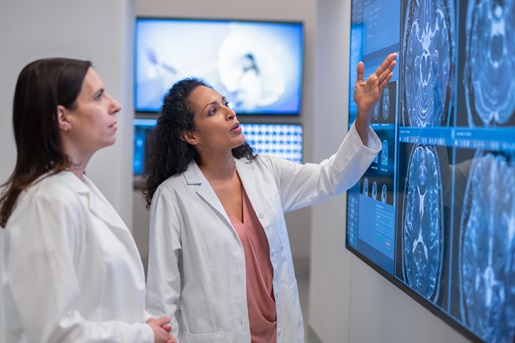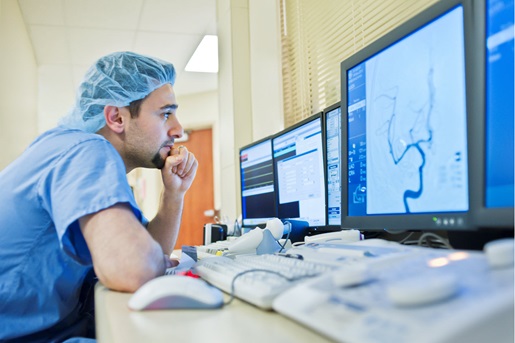Artificial intelligence has the potential to improve patient outcomes and increase provider efficiency
Artificial intelligence (AI) has profound economic implications for the healthcare industry. Medical professionals, policymakers, and the patients they serve all stand to benefit. The more the healthcare industry normalizes AI, the more they stand to earn. Let’s explore the economic impact of AI in healthcare and analyze its potential to enhance operational efficiency and reduce costs.
Need help picking the right scanner for your transition to AI-powered healthcare? Check out our post, AI in Healthcare: The Complete Guide.
Why AI is an important tool for the healthcare industry
AI in healthcare industry applications works to improve patient outcomes. It helps clinicians and administrators be better at their jobs, for example. It also helps enhance patient experiences with the healthcare industry and providers. These are a few of the areas where AI can have a positive impact:
- Pharmaceutical research: increasing safety, reducing costs, and accelerating time to market
- Treatment plans: improving quality of care with tools that benefit clinicians and patients
- Diagnostics: increasing accuracy using historical data and patient information at scale
- Supplemental support: reducing the need for and pressure on specialized practitioners
- Administrative: eliminating mundane tasks in billing, scheduling, office management, etc.
Though it offers many benefits in healthcare, AI also presents unique challenges, including data security and the threat of cyberattacks. To ensure safe and accurate diagnostic advice, ethical data collection practices are paramount. Any AI model is only as effective as the data it's trained on, and that's especially true in healthcare. Groups like the World Health Organization (WHO) work to ensure the ethical use of AI in healthcare market settings. Recent guidance covers the use of generative AI in medical settings, for example.
Did You Know?:The RICOH fi-8170 is a 2023 Future of Work Product of the Year Award winner, recognized as one of the “most innovative and disruptive products and solutions that have positively supported hybrid work experiences across the globe.” Learn more here.
Assessing the economic impact of AI in healthcare
The economic impact of AI in healthcare is already taking root. Thanks to widespread AI adoption, many healthcare organizations are already reaping the rewards. AI helps drive healthcare providers' financial success from two angles:
- Eliminating repetitive manual tasks reduces office and support staff costs
- Increased operational efficiency frees up skilled individuals to focus on important, high-value tasks
According to research by Deloitte, 75% of large healthcare organizations invested over $50 million in AI in 2019. 95% of mid-sized organizations invested in AI in amounts under $50 million. Based on findings from the article, 73% of all healthcare organizations planned to increase their AI investments in coming years. This rush to adoption was likely inspired in no small part by the challenges of the onset of the pandemic in 2020.
Experts estimate that in the US, AI will save the healthcare industry between $200-$360 billion annually, 35% of which will be administrative. In Europe, estimates suggest that AI will save as many as 403,000 lives per year and between 170.9-212.4 billion euros.
The promise of AI in healthcare depends on data
Healthcare providers are enthusiastic about the ways AI helps them increase efficiency. The economic impact of AI in healthcare is already showing significant successes. But AI won’t be replacing doctors anytime soon. The truth is, AI implementation isn’t just a switch you can flip on or a single software you can install. Instead, healthcare organizations should treat AI as one element of human-driven healthcare interactions.
To meet that goal, healthcare providers will need to train their AI models on huge quantities of high-quality data. Making that source material available means digitizing physical assets and digitalizing healthcare workflows. Scanning technology is a critical part of that process, since it serves as the on-ramp to AI. To learn more about bringing digital transformation to your healthcare organization, download our free ebook, A Beginner’s Guide to Digitizing Your Business.
Our recommendation: RICOH fi-8170
Those in the market for a high-volume healthcare document scanner have no shortage of options. We take great pride in having spent the last 50+ years researching, designing, and developing some of the most advanced and powerful electronics in the world, including our professional grade fi and SP series of scanners.
Built to purpose for the most demanding document handling jobs, fi and SP scanners are capable of processing tens of thousands of pages per day at the highest levels of accuracy. Their intuitive integration capabilities with all existing work suites minimize time-to-value for businesses looking to invest in tools that will pay dividends for years to come.
The RICOH fi-8170 is a perfect choice for healthcare professionals looking to introduce AI. Double-sided scanning at up to 70 pages per minute supports the speed required to digitize huge quantities of data at scale. The 100-page automatic document feeder turns high-volume scanning into a hands-off process. Proprietary Clear Image Capture (CIC) technology delivers crisp images and readable text. That helps ensure AI models are learning from accurate and complete data. And with a compact size of 11.8 x 6.7 x 6.4 inches, the RICOH fi-8170 fits easily in healthcare workspaces. Paperwork may be necessary, but patient care is the priority. Click here to learn more or shop the rest of our production scanner line.
Note: Information and external links are provided for your convenience and for educational purposes only, and shall not be construed, or relied upon, as legal or financial advice. PFU America, Inc. makes no representations about the contents, features, or specifications on such third-party sites, software, and/or offerings (collectively “Third-Party Offerings”) and shall not be responsible for any loss or damage that may arise from your use of such Third-Party Offerings. Please consult with a licensed professional regarding your specific situation as regulations may be subject to change.









